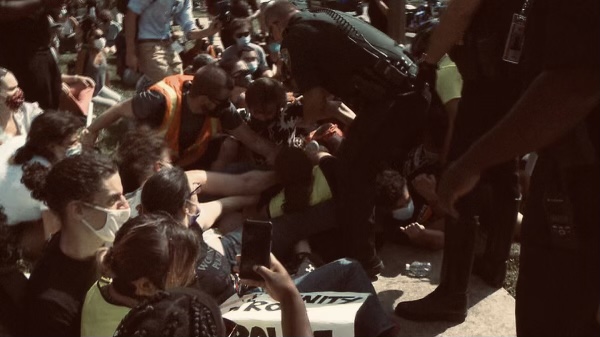Activism | April 13th, 2021
Tally 19: The Enduring Trauma of Revolution
By: Akilah Winters

“Let her go,” the protestors chanted as officers circled a car that contained Trish Brown, a candidate running for a district seat, in an 11-minute video via the Tallahassee Democrat. Brown sat in the driver’s seat as protestors argued with officers to give her a ticket.
The officers pushed the crowd to the side of the car back and knelt on top of the protestors and held them down. Officers arrived in riot gear as the situation continued to escalate. Fury ignited in some protesters as they yelled at cops to release them from their grip all across from the Florida State Capitol building.
The protest occurred in response to the killings of Breonna Taylor, George Floyd, Ahmaud Arbery, Tony McDade and many others.
Officers arrested 14 protesters on the day of the September 5 protest. Five more people received an arrest warrant after the event. The protestors became known as the Tally 19.
Now, members of the Tally 19 are recounting their trauma and the effects their arrest has had on their lives.
Irfan Kovankaya, the Dream Defenders organizing lead and a Tally 19 protestor, recalled the blurred series of violent events leading up to their arrest.
“One minute we were marching on the literal sidewalk across from the Capitol… and then I remember one of the cars in the car caravan was pulled over for allegedly driving too slow,” Kovankaya said. “Next thing you know I remember police pulled up in riot gear vastly outnumbering us and then I remember them running up towards us and tackling us, knocking us on the floor.”
One memory, in particular, stuck out to some members: the holding center where charges were processed. The 23-year-old explains how the officers were unsure of the charges to assign to him.
“I remember the police were trying to figure out what charges to hit me with. They were almost debating it. They didn’t know which officer arrested me and neither did I…I didn’t think I necessarily did anything illegal but the police found something they think applies.”
Timothy White, a Tally 19 protester and gig worker, also felt the injustices as a Black individual when the officers tried to determine their charges in the holding cell. White is one of the original 14 protestors who was first charged with a third-degree felony of inciting a riot, according to the booking report.
Only one member, Benjamin Grant, remains with a felony charge. The rest had their charges diminished to misdemeanors and most were offered diversion deals but did not take them.
“What they charged me with was inciting a riot, but I didn’t think I incited a riot, I was just calling out the mess that they were doing,” said White.
Florida Law considers “organizing, promoting, encouraging, participating in, or carrying on a riot” or “urging or engaging other people to riot” a third-degree felony.
“I did nothing basically, and they tried to charge me, a Black person, with a felony charge. I remember when they did it too because when I was getting booked and they had us in the area. They kind of just said to throw on the felony charge. One of the cops looked at me and just said that,” said White.
The arrest has made it extremely difficult for some to get certain opportunities. For Kovankaya, in particular, getting a job and applying for scholarships has been tough with an arrest record.
“It has definitely caused me stress because I am at a time in my life where I am applying for jobs and for more schooling… I don’t want any employers to view me any differently because of this charge however at the same time I also would only want to surround myself around an employer who is understanding of that and who reflects my same values,” said Kovankaya.
Even after their arrest and discouraged opportunities, some members prepare to keep fighting police brutality and systemic racism occurring in our society.
“I think getting arrested makes me want to go out more to be totally honest…now that I have gone through the process it’s not ideal and it sucked, but I also would rather it be me than someone else and I would rather be there as a sense of comfort when there are other people getting arrested if that is something that is happening clearly I would like to avoid that,” said Zachary Leslie, a Tally 19 protestor and Tallahassee resident.
Although they kept fighting for what they believed in, getting arrested made them focus on contributing to and supporting organizations that help the cause.
“I’m learning that I would much more want to be an organizer because then you start to learn how to pull more strings and how to talk to people and get people from any walk of life to actually listen to what you’re saying and start bringing them out so we can fight against the things that are all plaguing us,” said White.
Some members of the Tally 19 have publicly shared their reaction and disagreement to HB1, a bill proposed by Governor Ron DeSantis after the September 5th protest that would increase the severity of consequences if protestors perform any illegal activities.
“If anything, that is discouraging me [from protesting] is just the HB1 Bill, that bill existing makes me want to be out more with that being said is that really worth garnering a felony if I do not know what my actual charges,” said Leslie.
The bill would also require a minimum term for a protestor convicted of battery, provide punishment for those who damage a memorial, and include other consequences. It is currently upon becoming a law and is being filed in the Florida Legislature.
“They have it so that if there is any vandalism, it can automatically degrade into a riot… well, there are already laws around the things they are trying to put into this bill that would make a crime a crime,” said White.
Organizations helped the protestors pay their bail and even supported them after their arrest.
“I had no idea that most of our bail got posted by the Tallahassee Bail Fund. There were Dream Defenders members and CPAC members and they knew my name…there were so many people already out there waiting for us…being checked on by those members in the organizations that I listed…it was completely uplifting that so many people really cared,” said Leslie.
Even with facing much support from the community, scrutiny still lured and taunted the protestors.
“People were doxing us by getting our information from the Tallahassee Democrat and looked at our Facebook profiles and would demean our value… that’s where a lot of the stress came because people are seeming to lack humanity, to be honest… just simply talking about Black Lives Matter as a whole brings out such a negative reaction in some people it’s bizarre that we’re in 2021 and that’s still a topic,” said Leslie.
Even peers close to some protestors have talked down on them because of their arrest. Kovankaya used to play competitive soccer growing up in where he was surrounded by Conservative views. After his arrest, he stumbled upon a long paragraph from a former teammate that scolded him for being arrested.
“A former teammate dm’ed me on Twitter a day or so after the arrest saying something along the lines of a long paragraph scolding me saying he is really happy he doesn’t keep in touch with me anymore because I have chosen a criminal lifestyle and it said ‘maybe you could have done something useful in your life but instead you decided to end up on the booking report’,” said Kovankaya.
Getting arrested for something one believes in can truly have a lasting effect on someone’s life. One can find lifelong solidarity from an event like the September 5 protest arrests, but events like those can also have a drastic effect on one’s life.
As of late, the court has not dropped the charges of the Tally 19 protesters.






